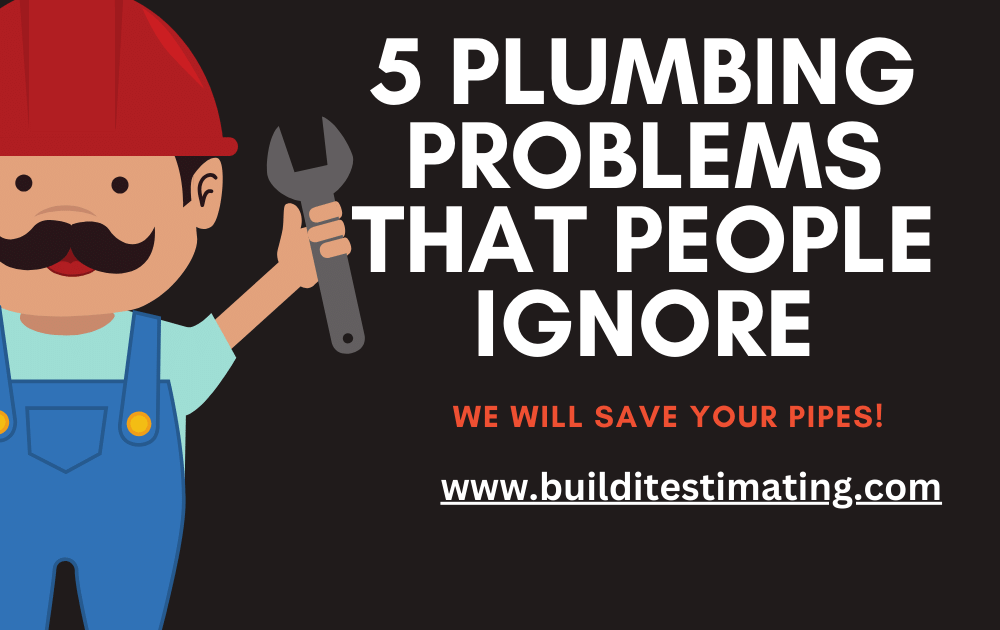Plumbing is an essential aspect of any home, yet it often goes unnoticed until a significant problem arises. Many homeowners ignore minor plumbing issues, believing they will resolve themselves or aren’t severe enough to warrant immediate attention. However, neglecting these common plumbing problems can lead to more significant, costly repairs and potential damage to your home. This article will explore five common plumbing problems that people often ignore and provide tips on how to prevent them.
Common Plumbing Problems That People Ignore
Homeowners frequently overlook minor plumbing issues due to their seemingly insignificant impact. However, these problems can escalate quickly, causing extensive damage and increased repair costs. Here are five common plumbing problems that are often ignored but should not be:
Leaky Faucets
Leaky faucets are one of the most common plumbing problems. The constant drip, drip, drip can be irritating, but it’s more than just a nuisance. Ignoring a leaky faucet can lead to higher water bills and potential water damage. Over time, the leak can worsen, causing significant damage to your sink or countertop and promoting mold growth.
Running Toilets
A running toilet is another frequently ignored plumbing issue. It might seem harmless, but a toilet that runs continuously can waste a significant amount of water—up to 200 gallons a day. This not only increases your water bill but also strains your plumbing system. Addressing the issue promptly can save water and money.
Clogged Drains
Clogged drains are often dismissed as minor inconveniences. However, repeated clogs can indicate a more severe issue within your plumbing system. Ignoring clogged drains can lead to unpleasant odors, slow drainage, and even sewage backups. Regular maintenance and proper waste disposal can help prevent these problems.
Low Water Pressure
Low water pressure can be frustrating, making it difficult to shower or wash dishes efficiently. While it might seem like a minor inconvenience, it can signal a more serious problem, such as a leak or blockage in your plumbing system. Ignoring low water pressure can lead to more extensive repairs and damage over time.
Water Heater Issues
Water heater problems are often ignored until they result in a cold shower. Regular maintenance of your water heater is crucial to ensure it operates efficiently and has a long lifespan. Ignoring issues such as strange noises, fluctuating water temperature, or leaks can lead to significant repairs or even replacement of the unit.
Leaky Faucets: Causes and Solutions
Leaky faucets are often caused by worn-out washers, O-rings, or valve seats. These components can deteriorate over time due to regular use and water exposure. In some cases, the issue might be due to improper installation or corrosion. Fixing a leaky faucet can be as simple as replacing these small parts. However, if the problem persists, it might indicate a more serious issue that requires professional attention.
Running Toilets: Identifying the Problem
Running toilets are usually caused by a faulty flapper valve, which controls the water flow from the tank to the bowl. Over time, the flapper can become worn or misaligned, allowing water to leak continuously. Other potential causes include a faulty fill valve or an improperly adjusted float. Identifying and fixing the problem can often be done with basic tools and replacement parts available at most hardware stores.
Clogged Drains: Prevention and Remedies
Preventing clogged drains starts with proper waste disposal. Avoid pouring grease, coffee grounds, and large food particles down the sink. Use drain screens to catch hair and other debris. Regularly flushing your drains with hot water and a mixture of baking soda and vinegar can help keep them clear. If a clog does occur, using a plunger or a plumbing snake can often resolve the issue. For persistent clogs, professional intervention may be necessary.
Low Water Pressure: Common Causes
Low water pressure can be caused by several factors, including clogged pipes, leaks, or issues with the municipal water supply. Mineral buildup inside pipes can restrict water flow, leading to decreased pressure. Inspecting your plumbing system for visible leaks and ensuring your pipes are clean can help address this issue. If the problem persists, it may be necessary to consult a professional plumber to diagnose and fix the underlying cause.
Water Heater Problems: Warning Signs
Water heater issues often present warning signs before they become severe. These can include unusual noises, inconsistent water temperature, and visible leaks. Regularly flushing the tank to remove sediment buildup can help maintain efficiency. If you notice rust-colored water or a significant drop in hot water supply, it might indicate a more serious issue that requires professional repair or replacement.
Why People Ignore Plumbing Problems
Many homeowners ignore plumbing problems due to a lack of awareness or understanding of the potential consequences. Others might avoid addressing these issues due to the perceived inconvenience or cost of repairs. However, ignoring minor problems can lead to more significant issues, higher repair costs, and even health hazards due to mold and water damage.
The Cost of Ignoring Plumbing Issues
Neglecting plumbing problems can result in costly repairs and increased utility bills. For example, a leaky faucet can waste hundreds of gallons of water annually, significantly impacting your water bill. Similarly, running toilets and water heater issues can lead to higher water and energy costs. In severe cases, ignoring plumbing problems can result in water damage, mold growth, and structural issues, which can be expensive to repair.
Preventative Maintenance Tips
Regular maintenance is key to preventing plumbing problems. Simple steps, such as regularly inspecting your plumbing system for leaks, keeping drains clear, and maintaining your water heater, can help prevent minor issues from becoming major problems. Scheduling annual inspections with a professional plumber can also help identify potential issues early, ensuring your plumbing system remains in good condition.
The Role of Professional Plumbers
Professional plumbers play a crucial role in maintaining and repairing your plumbing system. They have the expertise and tools necessary to diagnose and fix a wide range of plumbing issues. Regular maintenance and timely repairs by a professional can extend the lifespan of your plumbing system, prevent costly repairs, and ensure the safety and efficiency of your home.
DIY Plumbing Tips for Homeowners
While professional plumbers are essential for major repairs and maintenance, homeowners can handle minor issues and preventative maintenance themselves. Simple tasks, such as fixing a leaky faucet, unclogging drains, and inspecting visible pipes for leaks, can be done with basic tools and a bit of knowledge. However, it’s important to know your limits and call a professional for more complex issues.
How to Identify Potential Plumbing Problems Early
Early identification of plumbing problems can save time, money, and prevent extensive damage. Regularly inspecting your plumbing system for signs of leaks, corrosion, and other issues can help catch problems before they escalate. Listening for unusual noises, monitoring water pressure, and keeping an eye on your water bill for unexplained increases can also help identify potential issues early.
The Importance of Regular Inspections
Regular plumbing inspections are essential for maintaining a healthy plumbing system. During an inspection, a professional plumber can check for leaks, corrosion, and other potential problems. They can also ensure your water heater, pipes, and fixtures are in good working condition. Regular inspections can help catch minor issues before they become major problems, saving you time and money in the long run.
When to Call a Plumber
Knowing when to call a plumber is crucial for maintaining your plumbing system. While minor issues can often be handled by homeowners, more complex problems require professional intervention. Signs that you should call a plumber include persistent leaks, low water pressure, slow drains, unusual noises, and significant changes in your water bill. Additionally, any issues with your water heater or sewage system should be addressed by a professional.
How to Choose a Reliable Plumber
Choosing a reliable plumber is essential for ensuring quality repairs and maintenance. Look for a plumber with proper licensing and insurance, as well as positive reviews and recommendations. It’s also important to get multiple quotes and ask about warranties on their work. A reliable plumber will be transparent about their pricing, services, and qualifications.
Environmental Impact of Plumbing Issues
Plumbing problems can have a significant environmental impact. Leaky faucets, running toilets, and inefficient water heaters can waste large amounts of water and energy. By addressing these issues promptly, you can reduce your environmental footprint and contribute to water and energy conservation efforts. Regular maintenance and upgrades to more efficient fixtures can also help minimize your home’s environmental impact.
Energy Efficiency and Plumbing
Energy efficiency is an important consideration for your plumbing system. Upgrading to energy-efficient water heaters, low-flow faucets, and toilets can reduce your energy and water consumption. Regular maintenance, such as insulating pipes and fixing leaks promptly, can also improve your plumbing system’s efficiency. By focusing on energy efficiency, you can lower your utility bills and reduce your environmental impact.
Innovations in Plumbing Technology
Advancements in plumbing technology have made it easier to maintain and repair plumbing systems. Smart water leak detectors, advanced water filtration systems, and energy-efficient fixtures are just a few examples of innovations that can improve your home’s plumbing. Staying informed about new technologies and incorporating them into your home can enhance the efficiency and reliability of your plumbing system.
Understanding Your Home’s Plumbing System
Understanding your home’s plumbing system is essential for maintaining it effectively. Knowing the location of your main water shut-off valve, how your water heater operates, and the layout of your pipes can help you address issues promptly and prevent damage. Familiarizing yourself with basic plumbing concepts and components can also make it easier to communicate with professionals and make informed decisions about repairs and upgrades.
Common Plumbing Myths Debunked
There are many myths about plumbing that can lead to improper maintenance and repairs. For example, many people believe that running water while using a garbage disposal prevents clogs, but this can actually cause blockages. Another common myth is that all plumbing problems can be fixed with DIY solutions, which is not always the case. Understanding the truth about plumbing can help you avoid mistakes and maintain your system more effectively.
Conclusion
Ignoring common plumbing problems can lead to significant damage, increased repair costs, and even health hazards. By addressing issues such as leaky faucets, running toilets, clogged drains, low water pressure, and water heater problems promptly, you can maintain a safe and efficient home plumbing system. Regular maintenance, early identification of potential issues, and professional inspections are key to preventing plumbing problems. Understanding your home’s plumbing system and knowing when to call a professional plumber can save you time, money, and stress in the long run.

